Related Research Articles

The Reconstruction era was a period in U.S history, which lasted from the end of the American Civil War in May 1865 until the Compromise of 1877.

The term Five Civilized Tribes was applied by European Americans in the colonial and early federal period in the history of the United States to the five major Native American nations in the Southeast, the Cherokee, Chickasaw, Choctaw, Muscogee, and Seminoles. Americans of European descent classified them as "civilized" because they had adopted attributes of the Anglo-American culture.
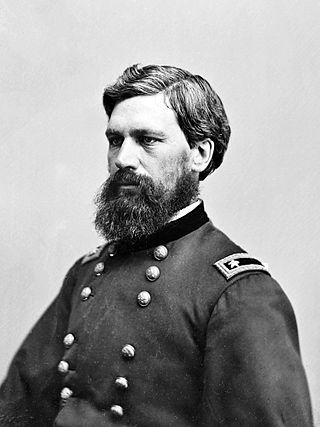
Oliver Otis Howard was a career United States Army officer and a Union general in the Civil War. As a brigade commander in the Army of the Potomac, Howard lost his right arm while leading his men against Confederate forces at the Battle of Fair Oaks/Seven Pines in June 1862, an action which later earned him the Medal of Honor. As a corps commander, he suffered two major defeats at Chancellorsville and Gettysburg in May and July 1863, but recovered from the setbacks as a successful corps and later army commander in the Western Theater.

The United States Department of War, also called the War Department, was the United States Cabinet department originally responsible for the operation and maintenance of the United States Army, also bearing responsibility for naval affairs until the establishment of the Navy Department in 1798, and for most land-based air forces until the creation of the Department of the Air Force on September 18, 1947.
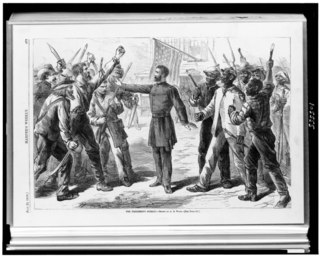
The Bureau of Refugees, Freedmen, and Abandoned Lands, usually referred to as simply the Freedmen's Bureau, was an agency of early Reconstruction, assisting freedmen in the South. It was established on March 3, 1865, and operated briefly as a U.S. government agency, from 1865 to 1872, after the American Civil War, to direct "provisions, clothing, and fuel...for the immediate and temporary shelter and supply of destitute and suffering refugees and freedmen and their wives and children".

Nelson Appleton Miles was a United States Army officer who served in the American Civil War, the American Indian Wars and the Spanish–American War. From 1895 to 1903, Miles served as the last Commanding General of the United States Army, before the office was transformed into the Chief of Staff of the Army.

John Eaton, Jr. was an American educator who served as the U.S. Commissioner of Education and a Union Army colonel during the American Civil War. On March 12, 1866, the United States Senate confirmed his January 13, 1866, nomination for appointment to the grade of brevet brigadier general of volunteers to rank from March 13, 1865.
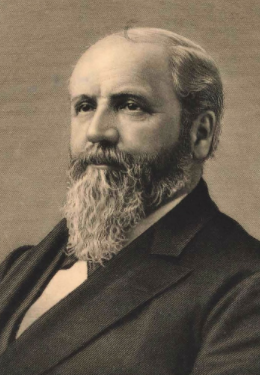
Clinton Bowen Fisk was a senior officer during Reconstruction in the Bureau of Refugees, Freedmen and Abandoned Lands and served as the Prohibition Party's presidential candidate during the 1888 presidential election. Fisk University was named in his honor after he endowed it with $30,000. In addition, he helped establish the first free public schools in the Southern United States for white and African-American children.
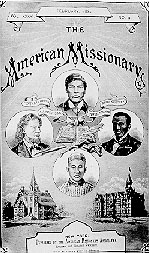
The American Missionary Association (AMA) was a Protestant-based abolitionist group founded on September 3, 1846 in Albany, New York. The main purpose of the organization was abolition of slavery, education of African Americans, promotion of racial equality, and spreading Christian values. Its members and leaders were of both races; The Association was chiefly sponsored by the Congregationalist churches in New England. The main goals were to abolish slavery, provide education to African Americans, and promote racial equality for free Blacks. The AMA played a significant role in several key historical events and movements, including the Civil War, Reconstruction, and the Civil Rights Movement.

Thomas Howard Ruger was an American soldier and lawyer who served as a Union general in the American Civil War. After the war, he was a superintendent of the United States Military Academy at West Point, New York.
In the United States, a freedmen's town was an African American municipality or community built by freedmen, former slaves who were emancipated during and after the American Civil War. These towns emerged in a number of states, most notably Texas. They are also known as freedom colonies, from the title of a book by Sitton and Conrad.

This is a selected bibliography of the main scholarly books and articles of Reconstruction, the period after the American Civil War, 1863–1877.
Charles Henry Howard was an officer in the Union Army during the American Civil War, and a newspaper editor and publisher. He was the younger brother of Union general Oliver O. Howard.
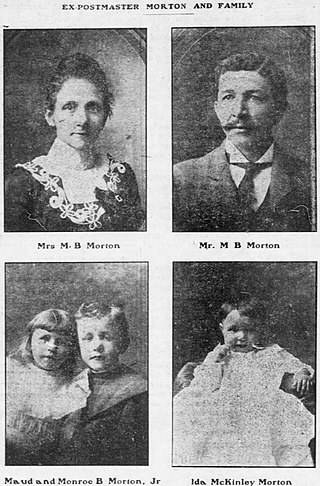
Monroe Bowers Morton, nicknamed Pink Morton was a prominent building owner, publisher, building contractor, developer, and postmaster in late 19th-century Georgia. An African American, he lived most of his life in Athens, Georgia, where he published a newspaper and built the Morton Building. The building included the Morton Theatre on its upper floors, a vaudeville venue, and offices for African-American professionals including doctors and druggists (pharmacists) on its ground floor. Occupants included Dr. Ida Mae Johnson Hiram, the first Black woman to be licensed to practice medicine (dentistry) in the state, and Dr. William H. Harris, one of the founders of the Georgia State Medical Association of Colored Physicians, Dentists and Druggists.

Knox Institute and Industrial School was a private elementary and secondary school in Athens, Georgia for African Americans. It was open from 1868 until 1928. Alumni include Monroe Morton, a builder and real estate businessman whose legacy includes the Morton Building in Athens, and Charles W. Chappelle. The school was named for Major John J. Knox of the Freedmen's Bureau. The federal agency helped fund the school. Athens' first African American Postmaster, Madison Davis, was one of those who helped purchase property for the school.

John Murray Hoag was a Union Army officer and Freedmen's Bureau official in Georgia during the Reconstruction Era. After leaving the Army, he was a prolific breeder of Shetland ponies in Iowa. Later in life he returned to the Army as a recruiter in New York.
John Emory Bryant served in the Union Army during the American Civil War and the Freedmens Bureau in Georgia during the Reconstruction Era. He also worked as a newspaper editor, Republican Party organizer, member of the Georgia House of Representatives and a candidate for U.S. Congress. Duke University has a collection of papers related to Bryant. He corresponded with William Anderson Pledger and Henry McNeal Turner. He was a member of the Methodist Church and involved in the temperance movement.
Reuben H. Tomlinson was a lawyer, Freedmen Bureau official, and politician in South Carolina during the Reconstruction era.

Brigadier-General John Randolph Lewis was an American dentist, soldier, administrator, and postmaster, known for his work with the Freedmen's Bureau.
References
- 1 2 "Knox concentrates on Freedmen's Bureau - Clarkston News". 25 August 2010.
- ↑ Enthusiastic as Ever, The Colored American (Washington, DC) 8 Mar 1902, page 4, accessed via Newspapers.com

- ↑ John J. Knox's Freedmen's Bureau in Georgia and the South collection. 8 February 2018. OCLC 456084548 – via Open WorldCat.